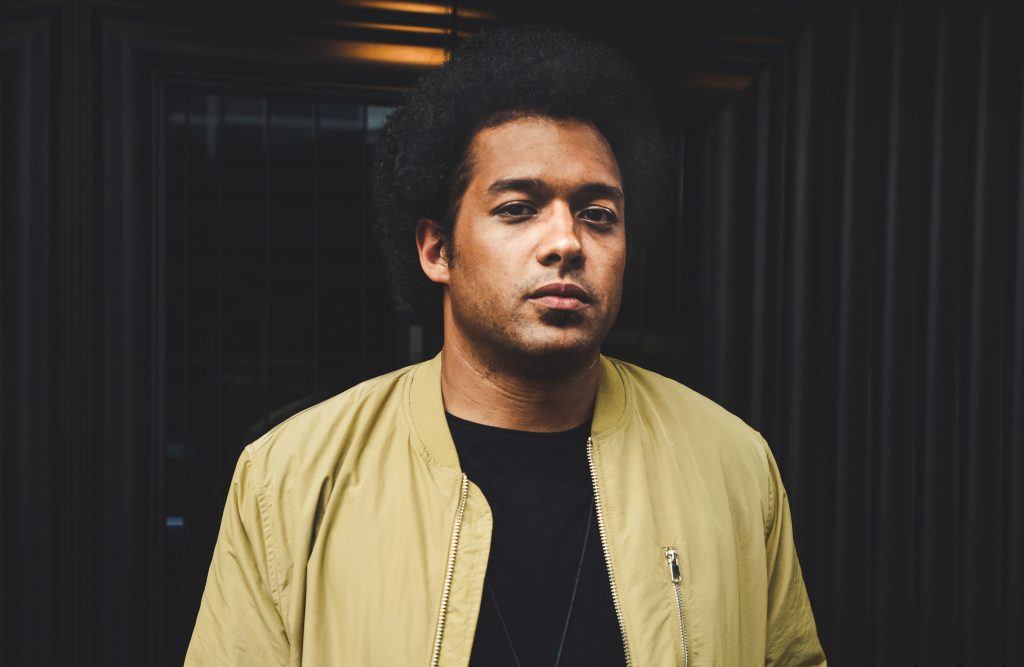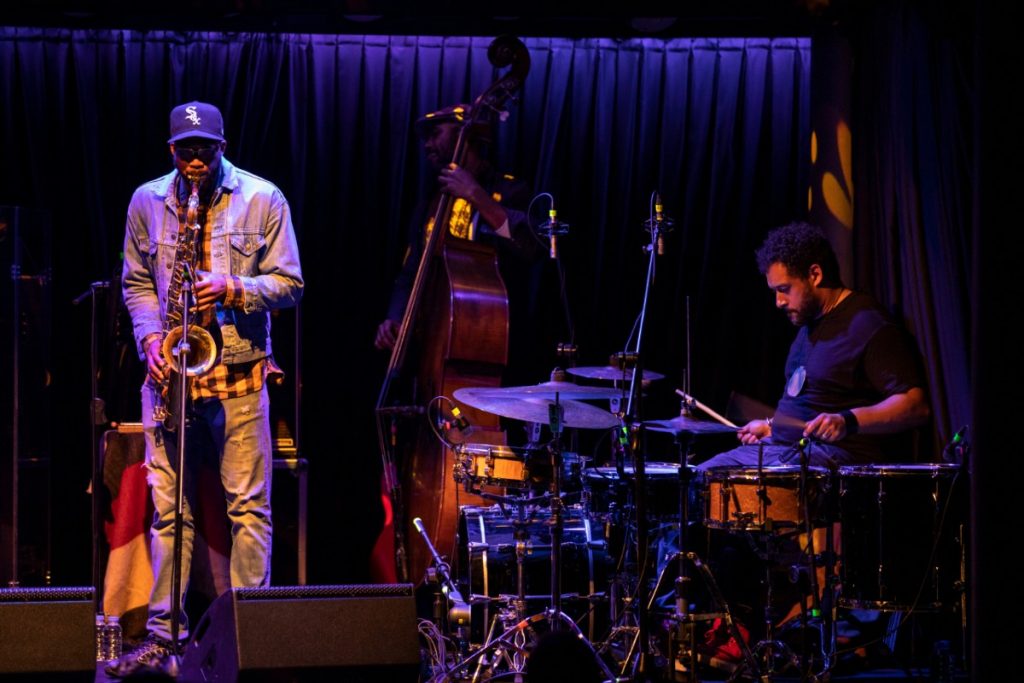When I’m told that Makaya McCraven might be five minutes late to our interview because he’s visiting the iconic Blue Mosque, my first reaction is to smile, because that’s very yabangee of him. The smile is quickly replaced by guilt for rushing him away from a well-deserved tour of the city, especially after his energized performance from the night before. This is why when I finally see him some ten minutes later at Salon IKSV, before his second consecutive performance, the first thing I do is apologize for taking him away from his sightseeing expedition. He apologizes back, for having kept me waiting. This cycle of back and forth apologies is eventually broken by a member of IKSV’s management, who politely reminds us (mostly me) that we only have ten minutes before Makaya has to leave for soundcheck.

Finally seated in the only room safe from the soft croons of the on-going soundcheck (sans Makaya, of course), he looks at me expectantly, waiting for me to set the ball rolling. In true Khadija fashion, I disappoint him by informing him that I am no longer allowed to call myself a drummer after seeing his performance yesterday, which was nothing short of insanity – the good kind.
Opening his set with the title track of his new album, In These Times (set to come out in Spring next year), the show started off slow and steady, with McCraven easing us into a very obvious realization: he is one talented musician. Playing grooves that are soft, stealthy and almost feline, he seems to suddenly have a change of mind and we all witness actual carnage on the drum kit. Also worth pointing out is the fact that his phone is resting on one of his floor toms all the while, even during said drum carnage, giving me major anxiety. (Spoiler alert: the phone leaves the scene completely unscathed, despite receiving a minor blow during the song Three Fifths of a Man.)
Now, I’m not a fount of wisdom when it comes to jazz, but even I knew that what I was aurally hearing was different from say, Chet Baker or Nat King Cole (who are, arguably, two very different sounds in themselves).
Born in Paris to parents who are both musicians (his mother is a Hungarian folk singer, and his father is an African American jazz drummer as well), I was curious to hear about how he thinks his music differs from that of his father, as well as talk about the identity politics of music, in an attempt to answer the eternally elusive question: What is jazz?
Turns out the answer is what we all thought it would be: vague and non-definitive. Because obviously, jazz isn’t one objective thing. It has layers upon layers of history, culture and influences, which is what Makaya tries to explain to me when I ask whether he considers his own music to be a jazz fusion experiment, or something with its own individual identity.

“To me, jazz, hip-hop, blues, soul and funk and afro beat and reggae, are all inter connected. There were jazz artists making hip-hop type music since the late 80s”, he says, name-checking Herbie Hancock, and adding that all of early hip-hop samples jazz in some way.
“I’ve tried to incorporate all this different music that I’ve grown up listening to, that are all part of one thread. The language is just there so we can discuss things like genres to categorize music, in order to sell it, but when I’m creating music, I don’t want to use those labels.”
This desire to keep things open-ended and highly subjective to the individual listener, sometimes lands McCraven at the receiving end of ‘Is this really jazz?’ accusations. But he isn’t bothered; subjectivity seems to be essential to his own creative process, “One of the things I love about instrumental music is that it doesn’t speak in literal language, but I can somehow still communicate to other musicians and the audience. It’s speaking on a different plane, and everyone has a different reception to it, depending on the music they grew up listening to, and the vocabulary they pick up on. The language is where it gets difficult.”
This is also why he tends to avoid adding lyrics to his music, to keep the context vague and universally relatable. “If I want to add a context, I might tell a backstory before performing the song, or I’ll put it in the title,” he adds.
Which brings me to my next question. How does one go about naming an instrumental song? Pretty much the same way as a song with lyrics, it turns out. You start with a placeholder, and then as you tweak the song around, the name evolves as well.
Take the song Three Fifths of a Man for instance. What started out as a placeholder denoting the 3/5 rhythm the song uses, quickly became a political statement, with Makaya being reminded of the Jim Crow laws and deciding to reference that in the title.
His creative process is also similar for the most part. I ask him about how most of his music and his gigs are dubbed ‘entirely improvised’, and he makes a valid counterpoint: isn’t that all music, and really everything? “My process of doing music is, in its formative stages especially, an investigation into the boundary between improvisation and composition” he says, elaborating with an anecdote from a gig he played with jazz guitarist Bobby Broom, after which someone asked Broom how much of the show was improvised.
“In my head I’m thinking, well we were playing songs the whole time, so we didn’t improvise anything except for the solos. But his response was ‘all of it’. And I found that interesting because even though we have a general form that we’re following, our reaction to each moment, and the moment itself is very different for all of us,” he says.
And this, coupled with sending his music to different producers, as in the case of Where We Come From, as well as his remix album, seems to echo the same message: you need to be okay with whatever is going to happen. Fear of the unknown can’t and shouldn’t hold you back. “That’s one of the thrills of improvisation I guess. A lot of the deepest and greatest questions that face humanity lie at the end of the unknown,” he muses.
This reminds me of his decision to move to Chicago, and start making his own music, instead of going after (potentially more lucrative) gigs, which I ask him about; particularly about how he found the courage to not compromise his own creative integrity. To which he said “I was very lucky to have two musicians as parents, who told me two things from a very young age. The first was to find your voice and sound. And the second is that to be a musician, you have to be willing to work.” I press him to in turn give some advice to all emerging musicians, and he says after a moments pause “You have to work harder than everybody. But you also need to make sure that whatever you’re investing your time and energy in, is something that will grow in the long term. You’ve got to love it because it’s not for the faint of heart. It’s not easy. Touring is fun, it’s amazing, it’s enlightening, but it’s also really hard.”

The topic of advice reminds me of my final question for Makaya: how does he deal with self-doubt as an artist, which seems to be something all creatives experience. He answers this by telling me of the tagline he used to give his bandmates before a show, during his European tour a couple of years ago. “My motto for that tour used to be: Let your suckiness shine. You’ve done the work, maybe you still have more work to do, but today’s the big day, so get up there and let your suckiness shine,” he says.
At this point, all I’m thinking is that I wish my suckiness could shine just half as bright as Makaya, but instead of saying that out loud, I just thank him, and apologize for the millionth time, because I have definitely exceeded my time limit, and he is after all, a brilliant musician with a show to put on. And there you have it, a glance inside the mind of Makaya McCraven: drummer, beat scientist, and all around good guy.
Listen to his album Universal Beings here.
Photos and opportunity to interview courtesy of IKSV.










